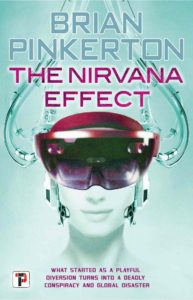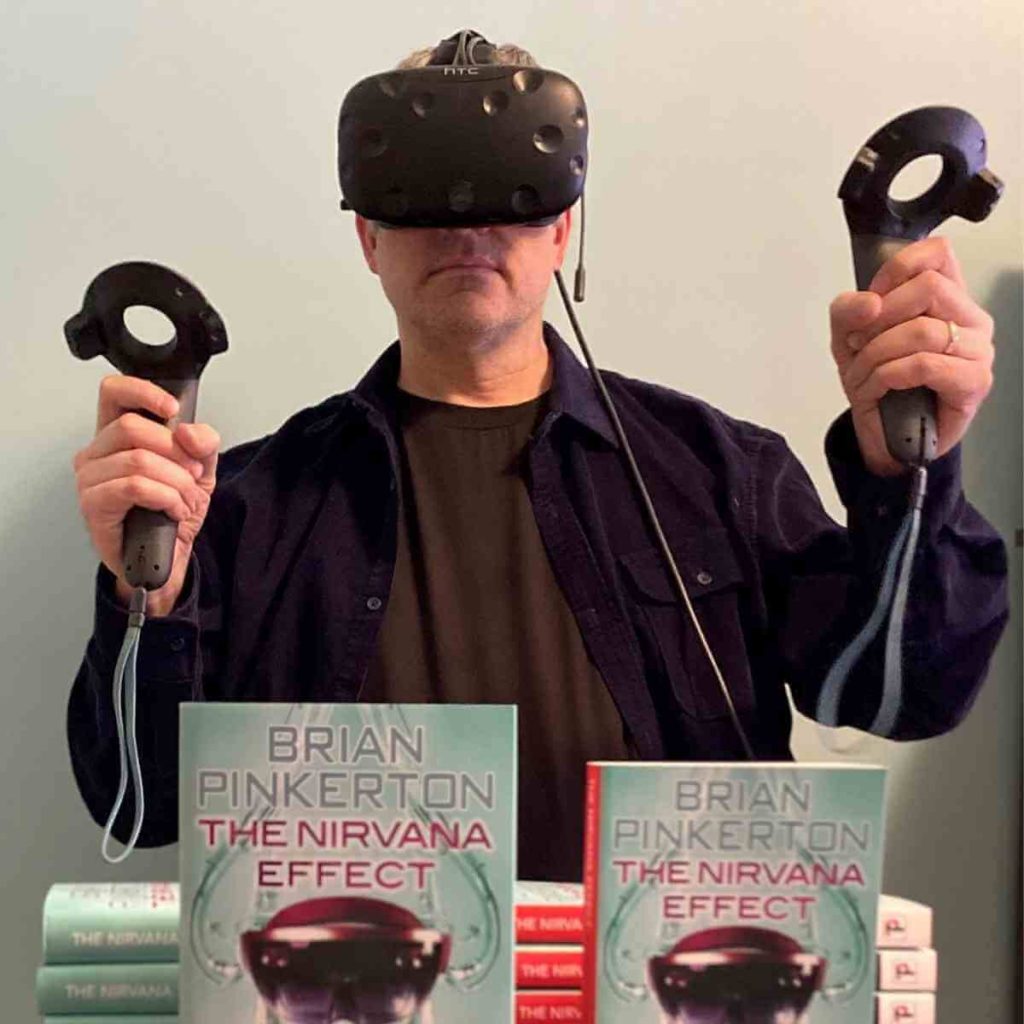This post was last updated on July 22nd, 2022 at 09:28 am
Perhaps the most intriguing aspect of “The Nirvana Effect,” a new science fiction novel by Brian Pinkerton, is just how uncomfortably close it comes to describing our world today.
In the not-too-distant future, people still spend a lot of time on digital devices. But their technology of choice is no longer the iPhone. Rather, it’s a type of virtual reality powered by a chip implanted at the base of the skull. A corporation called Dynamica has monopoly on this new tech, and it quickly becomes a national obsession. Millions of people spend hours each day immersed in fantasies—whether their pleasure is the beach or chocolate or sex or something more sinister.
“A dystopian novel like this felt right because of just the chaos the world is going through,” Pinkerton told Frugalmatic in a recent interview. “And there was just a lot of things I could do with this feeling that I have that technology is overtaking every aspect of our lives, for better or worse. Whether it’s education, entertainment, our work life, our social lives—we’re kind of losing that physical world and personal interaction.”
The book’s main protagonist is Aaron Holt, a struggling landscaper who refuses to “get chipped.” His business is slow because people no longer care about outward appearances as they become increasingly fixated on virtual worlds.

Aaron seeks justice for the chip destroying his relationship with his wife, who develops a severe virtual reality addiction. She ultimately enters a vegetable-like state after uploading a black market program known as Eternal Heaven. It’s considered a “suicide loop” because users never wake up from it.
Aaron joins forces with others who refuse to be chipped, and this group turns into outlaws when the U.S. government partners with Dynamica to require everyone to receive chip implants.
It might be hard to imagine the United States, a nation of individualists, agreeing to such a mandate. Yet the Dynamica chip offers such an intense and addictive experience that many embrace the mandate. They’re happy because the government will pay for their implant procedure. Long lines form outside chip implant clinics.
While “The Nirvana Effect” reflects some of Pinkerton’s own concerns about technology, he recognizes the benefits, too, including with social media.
“It’s very easy with social media to manipulate people, and that’s one of the dangers we have. But I don’t want to make it all dark. When you think about something like the invasion of Ukraine, the social media and global outrage has been remarkable. The sharing of the horror has prompted the world to react,” Pinkerton said. “That’s how social media can be used in a positive way, to bring the world together against something that’s just absolutely wrong.”
“The Nirvana Effect” invites a discussion about the costs versus benefits of consumer technology. After all, it doesn’t take something as powerful as “chipped” virtual reality to cause economic and cultural upheaval. Today’s technology is arguably doing much of what “The Nirvana Effect” describes. The effects aren’t as intense, but escapism has become the norm for many people.

Read more excerpts from my interview with Brian Pinkerton below. Some responses have been edited for length.
Frugalmatic: There’s a lot of talk right now about the metaverse and virtual or augmented reality. How did you decide what virtual reality technology should look like for your book?
Brian Pinkerton: The slant I took was more emotional and sensory than intellectual. I took it down a darker path. Certainly with virtual reality or the metaverse, it could be used for intellectual purposes, to make us smarter and better people. I took it down a path where it’s just about self-gratification. People use it to stimulate their senses for sex, for food, for distraction. To put themselves to sleep. To amuse themselves with games. Because of that, the chip is very addictive for a large part of society, like heroin. People just kind of wither away.
You have the part in the book where people use these devices they can hook up to themselves so they don’t have to get up to go the bathroom. That took it to another level. That was really creepy.
But I’ve heard about people who get hooked on a video game, and they’ll play for six hours, to the point that they don’t want to break away for the bathroom or to eat. They’re just so caught up in the game. They just want to keep it going. They don’t have a means to stop. So, you can certainly see how it can happen.
Some parts of the book I think is satirical, but maybe they’ll come true.
Read: Sedentary tech of the future
F: I’m curious how you use technology in your everyday life, and to what extent did your own habits influence your writing of this book, if at all.
BP: When I started writing stories, I was very young. I had a paper and a pen. That was my creativity, writing by hand. I was also drawing cartoons. I always had paper and pens around the house. That mode of creativity has never gone away.
I’m a terrible typist. It was always torture to write my novels and then put them onto a computer. For a while, my wife did it. But she’s busy. Then for a while, I paid someone to do it, but that felt kind of screwy. But what kind of saved me is technology. It’s dictation software.
I wrote out “Nirvana Effect” on lined paper, a bunch of pads of paper. I’d try to do a chapter every weekend. I’d get a first draft in pen. Then I’d go over it with a pencil and do all sorts of editing. My whole editing process was on paper. Once I got the physical paper part 80 to 90 percent done, then I’d put on the dictation headset, plugged it into a computer, and recited my book out loud. So I never really had to type it.
So just at the very end do I go into the technology side of it. And part of that is that I get more engaged in the physical world.
Check out more Frugalmatic interviews
F: In your book, there’s a political movement against Dynamica’s chip technology, but you don’t use any party labels. Does the opposition to Dynamica’s rising influence come from the political left or political right or perhaps both? For me, it was hard to tell.
BP: That’s great because that’s the outcome I was looking for. I wanted it to be ambiguous. I didn’t want it to be, “This is all about the Republican Party or the Democratic Party.” I didn’t want to turn it into a political book in that way.
But there are concepts in there that are political without labeling them. Over the course of the book, there are two presidential administrations. They both abuse the chip technology in different ways. Early on, the chip was all about, “Hey, Big Government is going to take care of you. Take this chip. We’ll give you survival credits. If you want to just lay around in your house all the time, that’s fine.” It’s all about giving people all this technology and freedom. It actually goes sour because people don’t leave their houses. They don’t take any responsibility. There’s no discipline. It just kind of crumbles.
Then a president comes in after that who really wants to crack the whip and restore capitalism. He goes to the other extreme, to the point that they’re taking citizens with the chip and kind of marching them into factories to start rebuilding society. But they’re doing it by taking away freewill.
There’s extreme left and extreme right stuff going on in the book. Basically, I wanted to show the authority messing up in different ways throughout the course of the book. I didn’t want it to be about this party or that party. I wanted it to be more general than that.
Brian Pinkerton is the author of several novels across multiple genres. Some of his other books include “The Gemini Experiment,” “Abducted,” “Vengeance,” “Anatomy of Evil,” “Killer’s Diary,” “Rough Cut,” “Bender,” and “How I Started the Apocalypse.”

